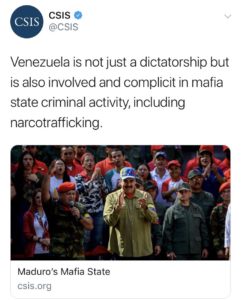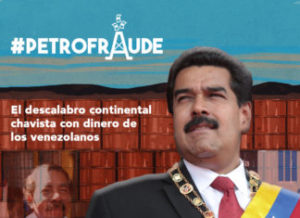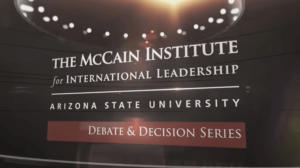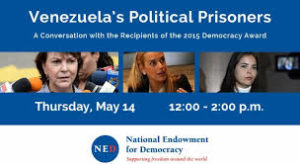
President Nicolas Maduro called for an early election, Reuters reports (HT: CFR) for the opposition-controlled National Assembly. Many Western countries have recognized the head of the assembly, Juan Guaido, as Venezuela’s president and denounced Maduro’s 2018 reelection as fraudulent.
In public, Mr. Guaidó remains upbeat and unwavering. At flash rallies around the capital, Caracas, he implores supporters to keep up the protests. But during an interview, he acknowledged that the opposition’s capacity to operate is hurting, The New York Times reports.
“The persecution has been savage,” he said in the empty hallway of one of the safe houses he uses.
As more of the ruling elite start to recognize Maduro’s unviability, evidence suggests that at least a portion of the regime has opened up to negotiate an exit, analyst Alejandro Arreaza writes for Americas Quarterly:
- The first reason to question Maduro’s grip on power is the government’s response to the April 30 uprising itself. This was the sixth revolt within the armed forces in recent months, and the government’s response to the events was even slower than in previous episodes. The failure to produce an immediate institutional response reflects the lack of internal consensus – the government denounced the events as a coup attempt, yet despite threats of arrest, the main leader of the rebellion remains free….
-

Connectas
Second, Maduro seems to have entered a vicious cycle of mistrust. News reportssuggest the rebellion may have involved multiple senior members of the regime. Although he is now trying to introduce changes in the government, Maduro can no longer trust his inner circle. His ability to reconfigure the administration will be seriously compromised and likely result in further isolation. With collapsing revenues and no credibility to implement reforms, Maduro has little to offer to strengthen the support of the regimes’ various factions.
- Third, the leading role in the uprising taken by members of the National Guard and the national intelligence services (SEBIN), which are supposed to be the most loyal to Maduro, reveals the fragility of his position. This could indicate how the increase in the cost of sustaining the status quo might be affecting loyalties. These sectors of the security apparatus have been in charge of controlling protests and managing political prisoners and are therefore paying the highest personal costs for participating in the regime’s repression….
- That points to another reason why the regime may have lost more on April 30 than did the opposition. Despite setbacks, the opposition has preserved its greatest asset: the capacity to mobilize the public. Re-engaging with factions of the regime to look for new possibilities of transition could become more difficult after the failure of this uprising, and sectors that might have been excluded from the original deal will probably need to be incorporated and offered guarantees. RTWT

Source: McCain Institute
Venezuela is at a critical crossroads, according to the Democracy & Human Rights Working Group, a nonpartisan initiative convened by Arizona State University’s McCain Institute for International Leadership. For the first time in decades, a democratically elected leader is in a position to potentially end the criminal regime that has crippled Venezuela. Recommendations for the U.S. administration to support Venezuela’s return to democracy include:
- Continuing to work on a bipartisan basis with the international community and Venezuela’s democratic activists to support Venezuela’s democratic transition, specifically Guaidó’s efforts to force Maduro to step down and to create a transitional government until free and fair elections take place.
- Continuing and strengthening targeted economic sanctions against Maduro and his inner circle, including travel bans, against those individuals who have committed human rights abuses and other crimes, such as drug trafficking, corruption, and destroying democratic institutions.
- Increasing international economic pressure on Venezuela by choking off the revenues from oil sales.
- Considering imposing sanctions on international gold traders and the refineries and companies they control that purchase gold, which benefits the Maduro regime.
- Encouraging Venezuelan military leaders to defend the legitimately and democratically elected officials, namely Interim President Juan Guaidó and his government….RTWT
 Venezuelan authorities should immediately release Jesús Medina, who they have arbitrarily imprisoned because of his reporting for nearly nine months, the Committee to Protect Journalists (CPJ) and Human Rights Watch said today.
Venezuelan authorities should immediately release Jesús Medina, who they have arbitrarily imprisoned because of his reporting for nearly nine months, the Committee to Protect Journalists (CPJ) and Human Rights Watch said today.
Despairing of a quick resolution, Mr. Guaidó’s European allies have redoubled efforts to secure a negotiated pact between the opposition and the government, moving the main front in Venezuela’s political battle to the diplomatic arena, said Félix Seijas, the director of Caracas-based pollster Delphos, which has advised the opposition.
“The government feels that the time is in their favor, and they are not necessarily wrong,” he told the Times. “Neither side can strong-arm the other, but the government feels this situation is something they can manage and control.”







